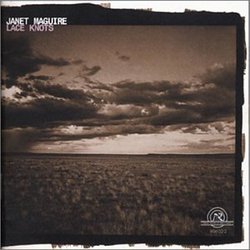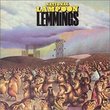| All Artists: Janet Maguire, Hartmut Bethke, A Cappella Ensemble Lübeck, Julie Mellor, Elisabetta Bocchese, Cristina Mantese Title: Janet Maguire: Lace Knots Members Wishing: 0 Total Copies: 0 Label: New World Records Release Date: 3/25/2003 Genres: Special Interest, Pop, Classical Styles: Vocal Pop, Opera & Classical Vocal, Chamber Music, Historical Periods, Classical (c.1770-1830) Number of Discs: 1 SwapaCD Credits: 1 UPC: 093228060222 |
Search - Janet Maguire, Hartmut Bethke, A Cappella Ensemble Lübeck :: Janet Maguire: Lace Knots
 | Janet Maguire, Hartmut Bethke, A Cappella Ensemble Lübeck Janet Maguire: Lace Knots Genres: Special Interest, Pop, Classical
Janet Maguire (b. 1927), an American composer who has spent most of her adult life in Europe, studied composition and orchestration with René Leibowitz in Paris and co-authored Thinking for Orchestra with him. Deeply ... more » |
Larger Image |
CD Details
Synopsis
Album Description
Janet Maguire (b. 1927), an American composer who has spent most of her adult life in Europe, studied composition and orchestration with René Leibowitz in Paris and co-authored Thinking for Orchestra with him. Deeply influenced by the European avant-garde composers of the 1950s and 60s?Stockhausen, Ligeti, Nono, and Xenakis in particular?her musical output is defined by an interest in extended instrumental and vocal timbres, free and non-metric rhythms, and non-tonal pitch structures. Her compositions, however, although very much a part of this tradition, are not bound by the strict demands of that aesthetic, and in her writing she draws freely from ideas, forms, and sounds of European classical music, as well as those of Oriental and indigenous musics, to create a unique and personal universe. Her elegantly crafted works blend a pronounced lyrical strain with a great sensitivity to timbre. Compositions evolve organically, mostly avoiding conventional patterns of development. Novel timbral effects?achieved either by simple or more complex means?are judiciously used to intensify drama. The Cummings Lieder are given spare, delicately embellished settings as befit their suggestive and elusive utterance; Invenzione and L?Altro Quartetto feature virtuosic writing for augmented string quartet (by humming in the former and light percussive effects in the latter); Così and Lace Knots are miniature vocal scenas. Per Acqua, for two choirs, one all men, the other all women, is inspired by a Venetian story of unrequited love, while Inno a Dio is a profound expression of faith; both deploy a rich and affecting variety of choral effects. Haunting, jewel-like in their succinctness and concentrated emotion, this rich array of chamber and choral works reveal a distinctive composition! al voice worthy of broader notice.
Similar CDs
| Kra Yaneura No Kanrinin a & B Genre: International Music Label: Pioneer | |

 Track Listings (10) - Disc #1
Track Listings (10) - Disc #1


